牛津译林版(2019)必修 第三册Unit 1 Nature in the balance Grammar and usage 课件(共52张PPT)
文档属性
| 名称 | 牛津译林版(2019)必修 第三册Unit 1 Nature in the balance Grammar and usage 课件(共52张PPT) |
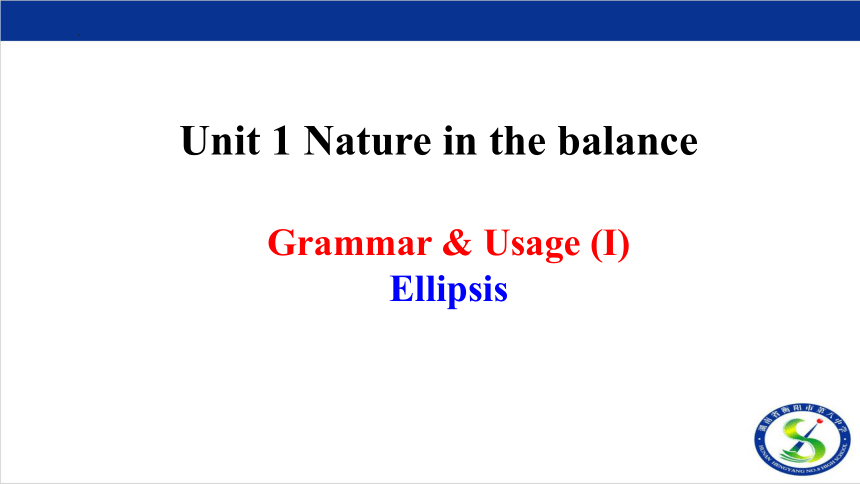
|
|
| 格式 | pptx | ||
| 文件大小 | 1.5MB | ||
| 资源类型 | 教案 | ||
| 版本资源 | 牛津译林版(2019) | ||
| 科目 | 英语 | ||
| 更新时间 | 2023-07-13 00:00:00 | ||
图片预览


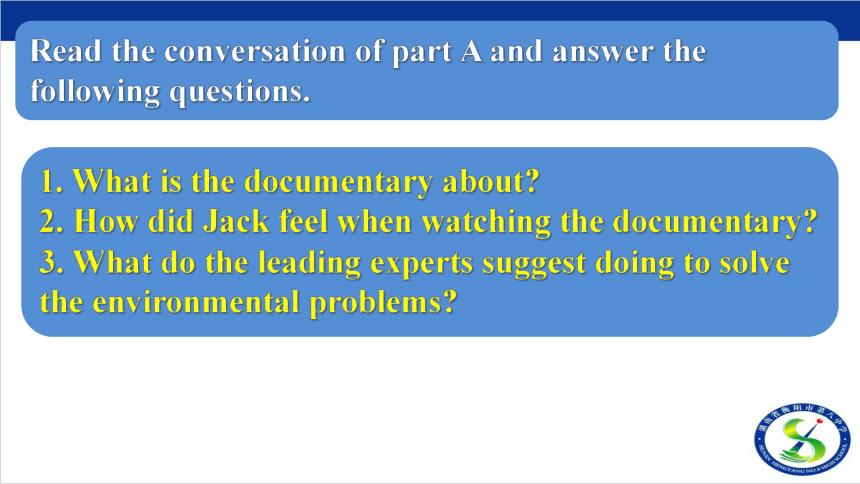
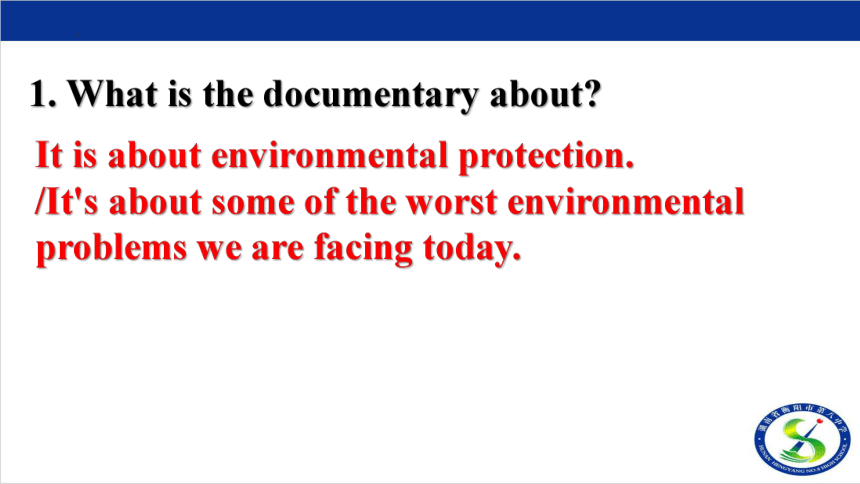
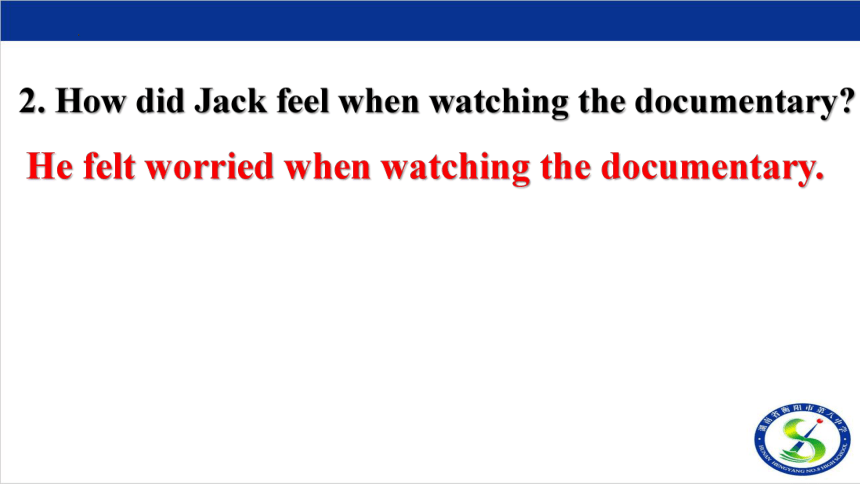
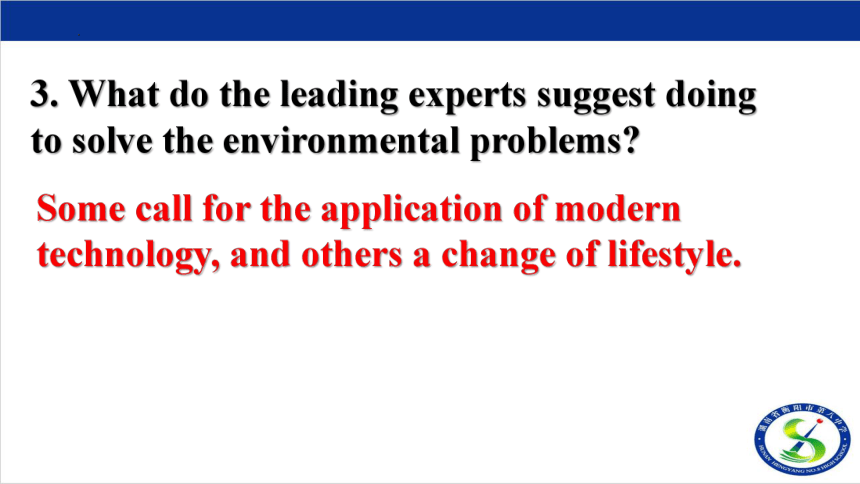
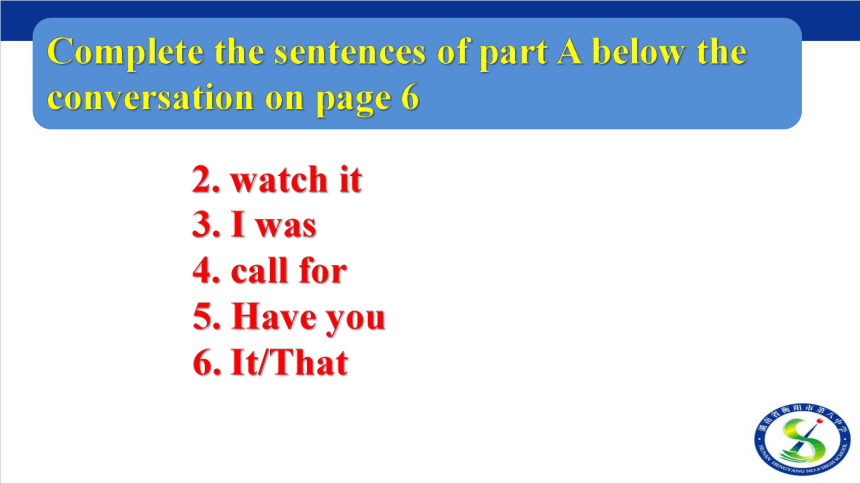
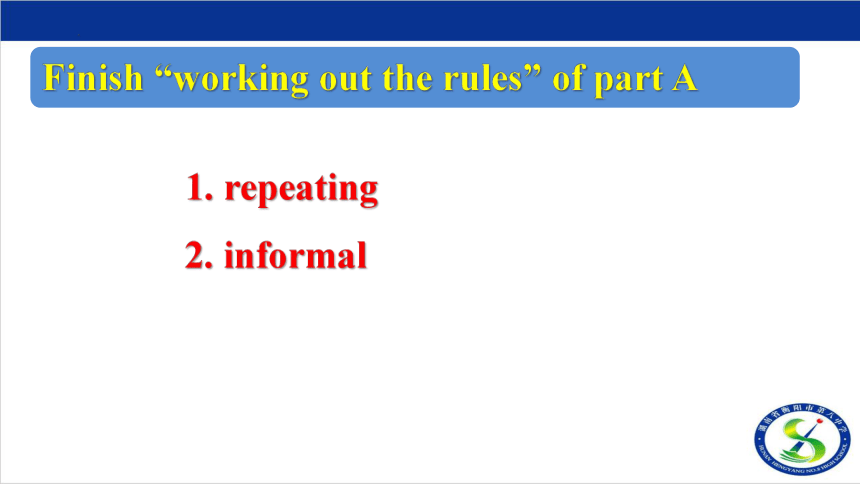
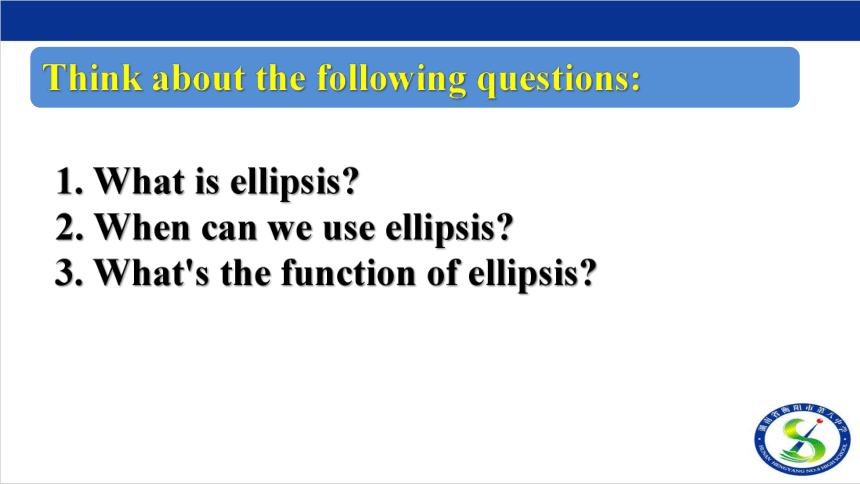
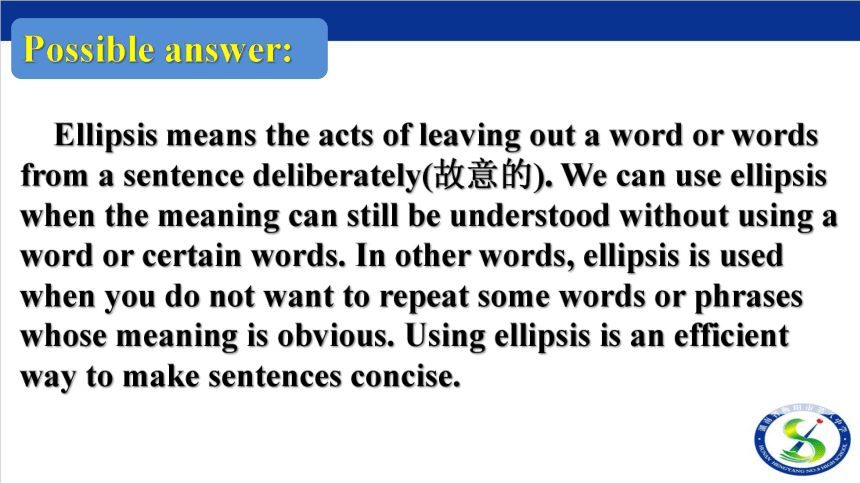
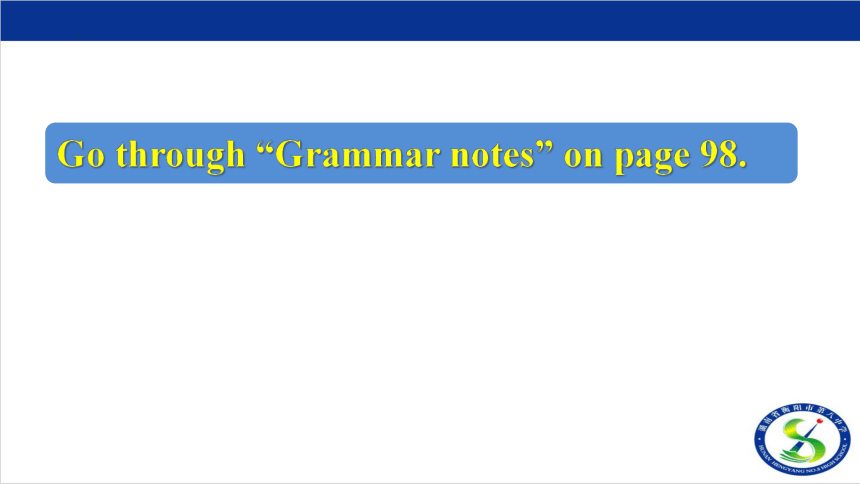

文档简介
(共52张PPT)
Grammar & Usage (I)
Ellipsis
Unit 1 Nature in the balance
Have you ever watched any TV programmes about environmental protection
What was it about
A Exploring the rules
Read the conversation of part A and answer the following questions.
1. What is the documentary about
2. How did Jack feel when watching the documentary
3. What do the leading experts suggest doing to solve the environmental problems
1. What is the documentary about
It is about environmental protection.
/It's about some of the worst environmental problems we are facing today.
2. How did Jack feel when watching the documentary
He felt worried when watching the documentary.
3. What do the leading experts suggest doing to solve the environmental problems
Some call for the application of modern technology, and others a change of lifestyle.
Complete the sentences of part A below the conversation on page 6
2. watch it
3. I was
4. call for
5. Have you
6. It/That
Finish “working out the rules” of part A
1. repeating
2. informal
Think about the following questions:
1. What is ellipsis
2. When can we use ellipsis
3. What's the function of ellipsis
Possible answer:
Ellipsis means the acts of leaving out a word or words from a sentence deliberately(故意的). We can use ellipsis when the meaning can still be understood without using a word or certain words. In other words, ellipsis is used when you do not want to repeat some words or phrases whose meaning is obvious. Using ellipsis is an efficient way to make sentences concise.
Go through “Grammar notes” on page 98.
1. 祈使句中的you和疑问句中的主语
2. 当上、下或前后两个句子的宾语一致时,下句或后句常省略宾语
(You) Shut up!住嘴!
Do you know Miss Gao —I don’t know (her).
简单句中的省略
3. 主语和谓语都很明确,此时为了简化或显得亲切等
(You come) This way, please.(省略了主语和谓语)
简单句中的省略
1. Have a seat, please!
2. Looks like rain.
3. Let’s do the dishes. I’ll wash and you dry.
4. Got any idea about the plan
You have a seat, please!
It looks like rain.
Let's do the dishes . I'll wash the dishes and you dry the dishes.
Have you got any idea about the plan
即时演练1 补全下列省略句
并列句中的省略
1.省略共同的主语或宾语。
Tom picked up a book on the floor and (Tom) handed it
to his teacher.
2.若主语不同,而谓语部分的系动词、助动词或情态动词相同,则省略后面的系动词、助动词或情态动词。
Jack must have been playing football and Mary (must
have been) doing her homework.
3.若主语与谓语动词相同,则省略后面的主谓成分。
His advice made me happy, but (his advice made) Jim angry.
4.若主语不同,但主要动词及后续部分相同,则省略主要动词及后续部分。
He has a knowledge of first aid but his friend doesn’t (have a knowledge of first aid).
1.Some of us study Japanese, and others study English.
Some of us study Japanese, and others study English.
2.He gave up drinking several months, but he returned to his old way later.
He gave up drinking several months, but he returned to his old way later.
即时演练2 写出下列句中可以省略的部分
3.My friend didn’t come to school, but I wonder why he/she didn’t come to school.
My friend didn’t come to school, but I wonder why he/she didn’t come to school.
即时演练2 写出下列句中可以省略的部分
1.状语从句的省略
(1)在when, while, if, as if, though, although, as, until, once, whether, unless, whenever等连接的状语从句中,当从句主语跟主句的主语相同且从句谓语中含有系动词be或从句的主语为it时,则从句中主语和be动词常被省略。
Will you be free this Sunday If (it is) so, let’s go camping.
这个周日你有空吗?如果有,我们去野营吧。
复合句中的省略
(2)在than, as等引导的比较状语从句中常省略某些成分。
They don’t use more water than (it is) necessary.
他们使用的水没有超出需要量。
复合句中的省略
注意:并非所有的状语从句都可以省略主语和be动词,由after, before, because等词引导的状语从句一般要改写成介词短语等,用动名词代替be动词。
Because he was ill, he didn’t attend the meeting.
→Because of being ill, he didn’t attend the meeting.(正)
复合句中的省略
2.定语从句的省略
(1)在限制性定语从句中,作宾语用的关系代词whom, which, that可省略(但whom, which紧跟在介词后时不能省略)。
The exact year (which/that) Angela and her family spent together in China was 2018.
复合句中的省略
(2)修饰way的关系词that/in which可以省略。
The way (that/in which) he speaks to us is really annoying.
复合句中的省略
3.宾语从句的省略
(1)及物动词后接宾语从句时,连接词that一般可以省略;但如果及物动词接两个或两个以上that引导的宾语从句,那么只有第一个that可以省略。
I truly believe (that) beauty comes from within.
复合句中的省略
(2)when, where, how和why引导的宾语从句有时可以仅保留引导词。
I know that a movie star will come to our city but I don’t know when (he will come to our city).
复合句中的省略
(1)当不定式在形容词afraid, anxious, eager, glad, happy, ready, willing等后作状语时,to后的内容常省略。
You can’t force him to answer the question if he’s not ready to (answer the question).
如果他不愿意回答这个问题,你不能强迫他。
动词不定式的省略
(2)某些使役动词,如make, let, have等和感官动词,如see, watch, notice, observe, hear等后面作宾补的不定式须省略to,但若这些动词用于被动语态,则to不省略。
We often hear her sing an English song in the classroom.
She is often heard to sing an English song in the classroom.
动词不定式的省略
(3)并列的不定式可以省略后面的不定式符号to。但若两个
不定式之间表示对比关系时,不能省略to。
He likes to swim more than (to) skate.
比起溜冰他更喜欢游泳。
He believes it important to study rather than to make friends.
(对比)他认为最重要的是学习而不是交朋友。
动词不定式的省略
(4)当不定式在某些动词后作宾语时,to后的内容常可省略。常见的动词有agree, afford, expect, forget, hope, know, manage, pretend, remember, refuse, want, wish, would like等。
I would do it for you, but I don’t know how to (do it for you).
我愿意为你做这件事,但是我不知怎么去做。
动词不定式的省略
(5)介词but, except (除了) 前有实义动词do的某种形式时,后面的不定式不带to。
All he could do was nothing but wait and see.
他所能做的只有等着瞧。
动词不定式的省略
(6)当不定式在be going to, be able to, have to, ought to, used to后作复合谓语时,不定式可省略。
They didn’t visit their parents as much as they ought to (visit their parents).他们应该多看望父母,但他们没有。
动词不定式的省略
注意:
省略的不定式内容若含有作助动词用的have或be的任何形式时,to后要保留原形的have或be。
类似这样用法的还有动词短语ought to, be going to, be about to, be supposed to, have to, used to及形容词glad, happy, pleased, delighted等。
He didn’t come, but he ought to have.
动词不定式的省略
(1)一些与动词、名词或形容词搭配的介词常常可以省略,而保留介词后的动名词。常见的结构有:
have difficulty/trouble (in) doing sth.
介词的省略
(2)表示时间的介词at, on和in在next, last, this, these, yesterday, tomorrow, one, any, every, each, some等词之前时,一般省略。
We go to school (on) every day except Sundays.
介词的省略
使用so, not等时的省略
在英语中,可以用so, not或其他方式来省略上文或问句中的一部分或整个句子。
—Can you finish your work today
—I think so.
—I don’t think so./I think not.
其他省略形式
注意:
hope, guess, be afraid的否定形式只能用not的形式,不能用not ... so的形式。
—The boys are not doing a good job at all, are they
—I guess not.
其他省略形式
Finish B1 on page 7
B Applying the rules
Suggested answers:
1. I cannot watch the documentary this week end, though I would like to.
2. Cows live on land, and fish in the water.
3. The Amazon rainforest is smaller now than 50 years ago.
4. He had planned to borrow a book on environment protection, but he didn't.
5. When taking photos of wildlife, we should make every effort to ensure that we keep away from the animals.
Finish B2 on page 7, and then answer two questions:
B Applying the rules
Suggested Answers:
1. 删除第3行 (take part in the forest clean-up activity)
2. 删除第5行 (is allowed here)
3. 删除第8行 (group)(cleaned up)(of the forest)
4. 删除第9行 (we) (that) (it had looked)
5. 删除第11行 (you're)
What is GreenHope
It is an organization devoted to protecting forests.
Answer the question:
What will you receive if you take part in the activity
A medal.
Answer the question:
Homework
1. Finish exercises C on P58
2. Finish exercises B3 on P7
1. — Have you seen this film
— Yes, I have seen it.
— Have you seen this film
— Yes, I have (seen it).
2. — Will the performance be put off till next week
— I hope it will not be put off till next week.
— Will the performance be put off till next week
— I hope (it will) not (be put off till next week).
Homework Checking
3. The emperor cannot break his promise, although he would like to break his promise.
The emperor cannot break his promise, although he would like to (break his promise).
4. You can watch the documentary or you can watch the feature film.
You can watch the documentary or (you can watch) the feature film.
Homework Checking
5. The opera house looks grander now than it did when I visited it last year.
The opera house looks grander now than (it did) when I visited it last year.
6. In the Amazon rainforest, you can see many plants known to us and you can see thousands of animals.
In the Amazon rainforest, you can see many plants known to us and (you can see) thousands of animals.
Homework Checking
7. When she was alone, she often felt anxious and uncomfortable.
When (she was) alone, she often felt anxious and uncomfortable.
8. I want to do something to help protect endangered animals, but I don't know how to help protect them.
I want to do something to help protect endangered animals, but I don't know how (to help protect them).
Homework Checking
9. The boy could not go out to play basketball, even though he wanted to go out to play basketball.
The boy could not go out to play basketball, even though he wanted to (go out to play basketball).
10. I like dancing more than I like singing.
I like dancing more than (I like) singing.
Homework Checking
Finish B3 on page 7
Possible answers:
1. Drive less, and we will have a greener world.
2. When building cities, think of Mother Nature.
B Applying the rules
Have you ever dreamed of __1__(fly) through the air like a bird If activities like water skiing or jet skiing sound like your idea of summer fun, now you can try flyboarding,__2__ new water sport that is catching on around the world. Flyboarding makes use of the __3__(power) engine of a jet ski to push water through an industrial hose (软管) __4__ (connect) to a board. The user fastens his or her feet onto the board and the force of the water pushes it into the air above the water. Balance, shifting the board and body are methods used __5__ (control) direction, allowing users to either move above the water __6__ dive below.
flying
a
powerful
connected
to control
or
Practice
The pressure of the water is typically controlled by an instructor, and depending __7 __ how much is used through the hose, users can go anywhere from 5 to 35 feet in the air. A quick training period before your flight __8 __(provide),but some companies even communicate with you through a headset during your flight for extra guidance.Flyboarding is __9 __ (general) considered safe, but height, weight and age restrictions vary across the country, so __ (be) sure to check ahead of time if you're planning an adventure.
on/upon
is provided
generally
be
Grammar & Usage (I)
Ellipsis
Unit 1 Nature in the balance
Have you ever watched any TV programmes about environmental protection
What was it about
A Exploring the rules
Read the conversation of part A and answer the following questions.
1. What is the documentary about
2. How did Jack feel when watching the documentary
3. What do the leading experts suggest doing to solve the environmental problems
1. What is the documentary about
It is about environmental protection.
/It's about some of the worst environmental problems we are facing today.
2. How did Jack feel when watching the documentary
He felt worried when watching the documentary.
3. What do the leading experts suggest doing to solve the environmental problems
Some call for the application of modern technology, and others a change of lifestyle.
Complete the sentences of part A below the conversation on page 6
2. watch it
3. I was
4. call for
5. Have you
6. It/That
Finish “working out the rules” of part A
1. repeating
2. informal
Think about the following questions:
1. What is ellipsis
2. When can we use ellipsis
3. What's the function of ellipsis
Possible answer:
Ellipsis means the acts of leaving out a word or words from a sentence deliberately(故意的). We can use ellipsis when the meaning can still be understood without using a word or certain words. In other words, ellipsis is used when you do not want to repeat some words or phrases whose meaning is obvious. Using ellipsis is an efficient way to make sentences concise.
Go through “Grammar notes” on page 98.
1. 祈使句中的you和疑问句中的主语
2. 当上、下或前后两个句子的宾语一致时,下句或后句常省略宾语
(You) Shut up!住嘴!
Do you know Miss Gao —I don’t know (her).
简单句中的省略
3. 主语和谓语都很明确,此时为了简化或显得亲切等
(You come) This way, please.(省略了主语和谓语)
简单句中的省略
1. Have a seat, please!
2. Looks like rain.
3. Let’s do the dishes. I’ll wash and you dry.
4. Got any idea about the plan
You have a seat, please!
It looks like rain.
Let's do the dishes . I'll wash the dishes and you dry the dishes.
Have you got any idea about the plan
即时演练1 补全下列省略句
并列句中的省略
1.省略共同的主语或宾语。
Tom picked up a book on the floor and (Tom) handed it
to his teacher.
2.若主语不同,而谓语部分的系动词、助动词或情态动词相同,则省略后面的系动词、助动词或情态动词。
Jack must have been playing football and Mary (must
have been) doing her homework.
3.若主语与谓语动词相同,则省略后面的主谓成分。
His advice made me happy, but (his advice made) Jim angry.
4.若主语不同,但主要动词及后续部分相同,则省略主要动词及后续部分。
He has a knowledge of first aid but his friend doesn’t (have a knowledge of first aid).
1.Some of us study Japanese, and others study English.
Some of us study Japanese, and others study English.
2.He gave up drinking several months, but he returned to his old way later.
He gave up drinking several months, but he returned to his old way later.
即时演练2 写出下列句中可以省略的部分
3.My friend didn’t come to school, but I wonder why he/she didn’t come to school.
My friend didn’t come to school, but I wonder why he/she didn’t come to school.
即时演练2 写出下列句中可以省略的部分
1.状语从句的省略
(1)在when, while, if, as if, though, although, as, until, once, whether, unless, whenever等连接的状语从句中,当从句主语跟主句的主语相同且从句谓语中含有系动词be或从句的主语为it时,则从句中主语和be动词常被省略。
Will you be free this Sunday If (it is) so, let’s go camping.
这个周日你有空吗?如果有,我们去野营吧。
复合句中的省略
(2)在than, as等引导的比较状语从句中常省略某些成分。
They don’t use more water than (it is) necessary.
他们使用的水没有超出需要量。
复合句中的省略
注意:并非所有的状语从句都可以省略主语和be动词,由after, before, because等词引导的状语从句一般要改写成介词短语等,用动名词代替be动词。
Because he was ill, he didn’t attend the meeting.
→Because of being ill, he didn’t attend the meeting.(正)
复合句中的省略
2.定语从句的省略
(1)在限制性定语从句中,作宾语用的关系代词whom, which, that可省略(但whom, which紧跟在介词后时不能省略)。
The exact year (which/that) Angela and her family spent together in China was 2018.
复合句中的省略
(2)修饰way的关系词that/in which可以省略。
The way (that/in which) he speaks to us is really annoying.
复合句中的省略
3.宾语从句的省略
(1)及物动词后接宾语从句时,连接词that一般可以省略;但如果及物动词接两个或两个以上that引导的宾语从句,那么只有第一个that可以省略。
I truly believe (that) beauty comes from within.
复合句中的省略
(2)when, where, how和why引导的宾语从句有时可以仅保留引导词。
I know that a movie star will come to our city but I don’t know when (he will come to our city).
复合句中的省略
(1)当不定式在形容词afraid, anxious, eager, glad, happy, ready, willing等后作状语时,to后的内容常省略。
You can’t force him to answer the question if he’s not ready to (answer the question).
如果他不愿意回答这个问题,你不能强迫他。
动词不定式的省略
(2)某些使役动词,如make, let, have等和感官动词,如see, watch, notice, observe, hear等后面作宾补的不定式须省略to,但若这些动词用于被动语态,则to不省略。
We often hear her sing an English song in the classroom.
She is often heard to sing an English song in the classroom.
动词不定式的省略
(3)并列的不定式可以省略后面的不定式符号to。但若两个
不定式之间表示对比关系时,不能省略to。
He likes to swim more than (to) skate.
比起溜冰他更喜欢游泳。
He believes it important to study rather than to make friends.
(对比)他认为最重要的是学习而不是交朋友。
动词不定式的省略
(4)当不定式在某些动词后作宾语时,to后的内容常可省略。常见的动词有agree, afford, expect, forget, hope, know, manage, pretend, remember, refuse, want, wish, would like等。
I would do it for you, but I don’t know how to (do it for you).
我愿意为你做这件事,但是我不知怎么去做。
动词不定式的省略
(5)介词but, except (除了) 前有实义动词do的某种形式时,后面的不定式不带to。
All he could do was nothing but wait and see.
他所能做的只有等着瞧。
动词不定式的省略
(6)当不定式在be going to, be able to, have to, ought to, used to后作复合谓语时,不定式可省略。
They didn’t visit their parents as much as they ought to (visit their parents).他们应该多看望父母,但他们没有。
动词不定式的省略
注意:
省略的不定式内容若含有作助动词用的have或be的任何形式时,to后要保留原形的have或be。
类似这样用法的还有动词短语ought to, be going to, be about to, be supposed to, have to, used to及形容词glad, happy, pleased, delighted等。
He didn’t come, but he ought to have.
动词不定式的省略
(1)一些与动词、名词或形容词搭配的介词常常可以省略,而保留介词后的动名词。常见的结构有:
have difficulty/trouble (in) doing sth.
介词的省略
(2)表示时间的介词at, on和in在next, last, this, these, yesterday, tomorrow, one, any, every, each, some等词之前时,一般省略。
We go to school (on) every day except Sundays.
介词的省略
使用so, not等时的省略
在英语中,可以用so, not或其他方式来省略上文或问句中的一部分或整个句子。
—Can you finish your work today
—I think so.
—I don’t think so./I think not.
其他省略形式
注意:
hope, guess, be afraid的否定形式只能用not的形式,不能用not ... so的形式。
—The boys are not doing a good job at all, are they
—I guess not.
其他省略形式
Finish B1 on page 7
B Applying the rules
Suggested answers:
1. I cannot watch the documentary this week end, though I would like to.
2. Cows live on land, and fish in the water.
3. The Amazon rainforest is smaller now than 50 years ago.
4. He had planned to borrow a book on environment protection, but he didn't.
5. When taking photos of wildlife, we should make every effort to ensure that we keep away from the animals.
Finish B2 on page 7, and then answer two questions:
B Applying the rules
Suggested Answers:
1. 删除第3行 (take part in the forest clean-up activity)
2. 删除第5行 (is allowed here)
3. 删除第8行 (group)(cleaned up)(of the forest)
4. 删除第9行 (we) (that) (it had looked)
5. 删除第11行 (you're)
What is GreenHope
It is an organization devoted to protecting forests.
Answer the question:
What will you receive if you take part in the activity
A medal.
Answer the question:
Homework
1. Finish exercises C on P58
2. Finish exercises B3 on P7
1. — Have you seen this film
— Yes, I have seen it.
— Have you seen this film
— Yes, I have (seen it).
2. — Will the performance be put off till next week
— I hope it will not be put off till next week.
— Will the performance be put off till next week
— I hope (it will) not (be put off till next week).
Homework Checking
3. The emperor cannot break his promise, although he would like to break his promise.
The emperor cannot break his promise, although he would like to (break his promise).
4. You can watch the documentary or you can watch the feature film.
You can watch the documentary or (you can watch) the feature film.
Homework Checking
5. The opera house looks grander now than it did when I visited it last year.
The opera house looks grander now than (it did) when I visited it last year.
6. In the Amazon rainforest, you can see many plants known to us and you can see thousands of animals.
In the Amazon rainforest, you can see many plants known to us and (you can see) thousands of animals.
Homework Checking
7. When she was alone, she often felt anxious and uncomfortable.
When (she was) alone, she often felt anxious and uncomfortable.
8. I want to do something to help protect endangered animals, but I don't know how to help protect them.
I want to do something to help protect endangered animals, but I don't know how (to help protect them).
Homework Checking
9. The boy could not go out to play basketball, even though he wanted to go out to play basketball.
The boy could not go out to play basketball, even though he wanted to (go out to play basketball).
10. I like dancing more than I like singing.
I like dancing more than (I like) singing.
Homework Checking
Finish B3 on page 7
Possible answers:
1. Drive less, and we will have a greener world.
2. When building cities, think of Mother Nature.
B Applying the rules
Have you ever dreamed of __1__(fly) through the air like a bird If activities like water skiing or jet skiing sound like your idea of summer fun, now you can try flyboarding,__2__ new water sport that is catching on around the world. Flyboarding makes use of the __3__(power) engine of a jet ski to push water through an industrial hose (软管) __4__ (connect) to a board. The user fastens his or her feet onto the board and the force of the water pushes it into the air above the water. Balance, shifting the board and body are methods used __5__ (control) direction, allowing users to either move above the water __6__ dive below.
flying
a
powerful
connected
to control
or
Practice
The pressure of the water is typically controlled by an instructor, and depending __7 __ how much is used through the hose, users can go anywhere from 5 to 35 feet in the air. A quick training period before your flight __8 __(provide),but some companies even communicate with you through a headset during your flight for extra guidance.Flyboarding is __9 __ (general) considered safe, but height, weight and age restrictions vary across the country, so __ (be) sure to check ahead of time if you're planning an adventure.
on/upon
is provided
generally
be
同课章节目录
- Unit 1 Nature in the balance
- Welcome to the unit
- Reading
- Grammar and usage
- Integrated skills
- Extended reading
- Project
- Unit 2 Natural disasters
- Welcome to the unit
- Reading
- Grammar and usage
- Integrated skills
- Extended reading
- Project
- Unit 3 The world online
- Welcome to the unit
- Reading
- Grammar and usage
- Integrated skills
- Extended reading
- Project
- Unit 4 Scientists who changed the world
- Welcome to the unit
- Reading
- Grammar and usage
- Integrated skills
- Extended reading
- Project
